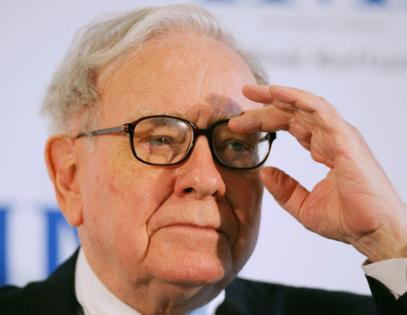Jonathan Levin: Warren Buffett caps a career built on humility
Published in Op Eds
Warren Buffett is stepping down as chief executive officer of Berkshire Hathaway Inc., the company he built alongside his later partner Charlie Munger for the past six decades. It’s a final show of humility by a man many consider the greatest investor of all time.
Operating in an era replete with purported Wall Street soothsayers, the 94-year-old Buffett always rejected the idea that anyone — even him — could predict the future. Nicknamed the Oracle of Omaha (a misnomer perhaps), he credited his success to patience and insisting on only buying the businesses he understood. From the early years of Berkshire, those included a textile business, insurance company GEICO, the Buffalo News and See’s Candies. After delivering a 20% annual compounded annual gain between 1964 and 2024, about double that of the S&P 500 Index, the business is now a behemoth valued at more than $1.16 trillion, more than 390,000 employees and a cash hoard totaling $347.7 billion.
Buffett gave credit to the people around him, including vice chairman for non-insurance operations Greg Abel — his chosen successor — and of course Munger, a lawyer by training and poker player. With the influence of Munger, Buffett slowly moved from a philosophy of buying “cigar butt” investments — as he’d learned from his mentor Ben Graham — to a style of investing that might best be characterized today as “quality”: buying great companies at the right price. The key example of that worldview in Berkshire’s portfolio became Apple Inc. “I am embarrassed to say that Tim Cook made more money for Berkshire than I ever did, so credit should be given to him,” Buffett said Saturday, with Apple CEO Cook in the audience.
Buffett’s legend grew during the 2008 global financial crisis when he opportunistically scooped up investments in Goldman Sachs Group Inc., General Electric Co. and Dow Chemical Co. He managed to do so because he had stockpiled cash in the runup to the crisis - much as he’s done in recent years. Yet he always dismissed the notion that he had any great foresight or that anyone in the investing business had such capacity — a theme that he returned to Saturday when asked about the current state of financial markets and the economic risks of the moment. In Buffett’s telling, he always just waited for the right opportunities to present themselves, and passed on anything less.
In a way, humility was Buffett’s brand. Though he worked briefly in New York early in his career, Buffett ultimately returned to build Berkshire in Omaha, Nebraska, where he was born and has lived in the home he bought in 1958 for $31,500. He always insisted on treating Berkshire’s shareholders as co-owners in the company, an ethos that was always on display at his sprawling annual shareholder meeting in Omaha, dubbed the Woodstock of Capitalism, in which Buffett would sit for hours taking questions from the audience.
Despite Berkshire’s incredible run, Buffett’s conservative tendencies may have also contributed to the company’s lagging performance in recent years — an era in which cheap and easy money often pushed valuations to extraordinary levels. Since the financial crisis, Berkshire is only keeping pace with the S&P 500, a benchmark that any investor can mimic through shares of an exchange-traded fund. Some of that may underscore the ways in which the investing industry has changed and become more democratized — but also harder to outperform even for the most gifted investors. Others would say that the equity market values are too high relative to historical levels and are set for a correction, and that cash-rich Berkshire may ultimately come out on top.
As for Buffett’s personal fortune of $168.6 billion, he owes at least some of it to his long career and life and the magic of compound investing, as he’s frequently admitted. Although Buffett’s announcement Saturday was unexpected, Abel, 62, has long been groomed as the Oracle’s successor. Buffett, starting to sound every one of his 94 years, said he would recommend to the board of directors that Abel become the new chief executive.
Earlier in the day, Buffett — with his signature folksy humor — dismissed the idea that Berkshire’s sizeable cash stockpile was somehow a gift to Abel to make him look good. “I wouldn’t do anything nearly so noble as to withhold investing myself just so Greg could look good,” he said. He wasn’t totally joking. As much as Buffett valued relationships, his first allegiance in business was always to Berkshire’s shareholders, something that he demonstrated once again when he laid the groundwork for his succession to begin.
_____
This column reflects the personal views of the author and does not necessarily reflect the opinion of the editorial board or Bloomberg LP and its owners.
Jonathan Levin is a columnist focused on US markets and economics. Previously, he worked as a Bloomberg journalist in the US, Brazil and Mexico. He is a CFA charterholder.
©2025 Bloomberg L.P. Visit bloomberg.com/opinion. Distributed by Tribune Content Agency, LLC.




























































Comments